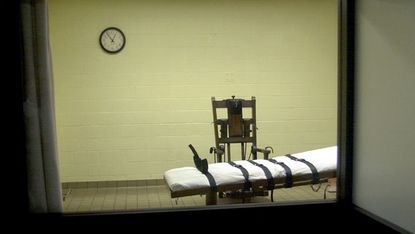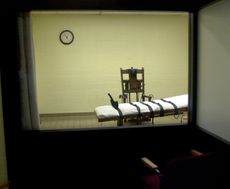Botched execution: Arizona prisoner takes two hours to die
Another botched lethal injection reignites debate over 'experimental' drugs used to carry out death penalty

A death row prisoner in Arizona took almost two hours to die by lethal injection, in the latest botched execution in the US.
Joseph Wood, a double murderer, "gasped and struggled to breathe for about an hour and 40 minutes", his lawyers told CNN. They filed an emergency appeal to halt the execution, but it was denied.
Wood was injected with an "experimental" cocktail of midazolam and hydromorphone, which his lawyers had previously warned could lead to an "agonising death". They said his execution was illegal as it amounted to "cruel and unusual punishment".
Subscribe to The Week
Escape your echo chamber. Get the facts behind the news, plus analysis from multiple perspectives.

Sign up for The Week's Free Newsletters
From our morning news briefing to a weekly Good News Newsletter, get the best of The Week delivered directly to your inbox.
From our morning news briefing to a weekly Good News Newsletter, get the best of The Week delivered directly to your inbox.
Arizona Governer Jan Brewer insisted the execution was carried out lawfully and told the BBC that according to eyewitness and medical accounts, "he did not suffer".
"This is in stark comparison to the gruesome, vicious suffering that he inflicted on his two victims, and the lifetime of suffering he caused their family."
Wood was convicted of murdering his ex-girlfriend and her father in 1989.
His lawyers said they would renew their efforts to uncover "how Arizona came up with the experimental formula of drugs it used today".
This case is likely to reignite the debate about drugs used in the capital punishment following two other botched executions this year. In January an Ohio prisoner was given the same combination of lethal drugs and took 30 minutes to die, and in April, Clayton Locket, a death row inmate in Oklahoma appeared to regain consciousness after the drugs had been administered and later died of a heart attack.
An EU ban on exporting sodium thiopental, one of the key drugs used in executions in the US has led state execution officials to start "improvising with new, untested drugs, according to USA Today.
Why are the drugs no longer available? Hospira, the only manufacturer of sodium thiopental in the US, stopped producing the sedative there in 2011 due to increasing pressure from anti-death penalty activists. It has told prison officials it opposes the drug's use in lethal procedures, according to the Wall Street Journal.
Production was moved to Italy, where there was further opposition from the Italian government over the use of the drug in lethal injections. The EU, which opposes the death penalty and the use of torture, introduced strict export controls in late 2011 to prevent drugs that could be used in executions from reaching the US.
Those rules also affected the supply of an alternative to sodium thiopental, called pentobarbital, which stops the lungs from working. It is manufactured in Denmark and the company that makes it has banned its use in executions. As pentobarbital only has a shelf-life of 18 months, existing stocks of that drug are now expired.
What has been the result? Some US prisoner executions have been delayed and even cancelled. The shortage of lethal drugs and the use of untried combination of others has resulted in botched executions and accusations of inhumane treatment and prolonged suffering.
Tennessee, Louisiana, Georgia and Arkansas have suspended use of the death penalty because of the difficulty of obtaining the drugs needed for the lethal injection.
Prosecutors in America are now less likely to seek the death penalty as a result of the difficulties involved. "There's been quite a radical change," Richard Dieter, executive director of the Death Penalty Information Centre, told USA Today. The number of executions in the US has fallen from 98 in 1999 to 39 in 2013.
What are the alternatives? Some US prisons have tried to find alternative combinations of drugs to use in lethal injections. State officials have been left "begging and borrowing" expired anaesthetic pentobarbital and have experimented with mixtures of substitute drugs, according to USA today.
Eight states in America offer death row prisoners the option to die in an electric chair, reports The Guardian: Virginia, Alabama, Kentucky, Oklahoma, South Carolina, Arkansas, Tennessee and Florida.
Arizona, Wyoming and Missouri use the gas chamber, while hanging is an option in New Hampshire, Delaware and Washington State.
Rick Brattin, a Missouri state Republican representative, proposed firing squads as an alternative to lethal injections. He told The Guardian: "I'm trying to come up with a solution that will be the most humane yet most economical for our state". Oklahoma and Utah still use firing squads, but only if the lethal injection or electrocution has deen deemed unlawful. In Utah, prisoners can only choose this option if they were sentenced before 2004.
What is the legal situation? "I know that in the near future, we will see more litigation," Dustin McDaniel, Araknsas's attorney general told USA Today. "We will see fewer executions. We will see states scrambling to come up with alternative methods. And there will be a lot of finger-pointing."
Campaigners opposed to the death penalty argue that the use of untested drugs might amount to "cruel and unusual punishment", which is prohibited by the US constitution.
"Lawyers for the two [Oklahoma] convicts said the lack of supplier information made it impossible to know if the drugs were safe and effective, or might possibly violate the ban on cruel and unusual punishment," the New York Times reports.
Create an account with the same email registered to your subscription to unlock access.
Sign up for Today's Best Articles in your inbox
A free daily email with the biggest news stories of the day – and the best features from TheWeek.com
-
Why is Tesla stumbling?
In the Spotlight More competition, confusion about the future and a giant pay package for Elon Musk
By Joel Mathis, The Week US Published
-
 How Taylor Swift changed copyright negotiations in music
How Taylor Swift changed copyright negotiations in musicunder the radar The success of Taylor's Version rerecordings has put new pressure on record labels
By Theara Coleman, The Week US Published
-
 Job scams are increasingly common. Here's what to look out for.
Job scams are increasingly common. Here's what to look out for.The Explainer You should never pay for an application or give out your personal info before being hired
By Becca Stanek, The Week US Published
-
 The pros and cons of the death penalty
The pros and cons of the death penaltyPros and cons Despite global progress towards abolition, public opinion remains divided as executions increase
By Harriet Marsden, The Week UK Last updated
-
 Death penalty: U.S. carried out historically few executions in 2022, but 1 in 3 were 'botched'
Death penalty: U.S. carried out historically few executions in 2022, but 1 in 3 were 'botched'Speed Read
By Peter Weber Published
-
 Why inmates on death row are choosing the electric chair
Why inmates on death row are choosing the electric chairSpeed Read Inmates in Tennessee are opting for electrocution because of botched lethal injection fears
By The Week Staff Published
-
 Isis Beatles: UK ‘drops opposition to death penalty’ for the jihadists
Isis Beatles: UK ‘drops opposition to death penalty’ for the jihadistsSpeed Read Home Secretary will seek ‘no assurances’ that two British fighters are not executed under US law
By The Week Staff Last updated
-
 Doyle Lee Hamm: ‘botched’ aborted execution was ‘torture’
Doyle Lee Hamm: ‘botched’ aborted execution was ‘torture’Speed Read Alabama death row inmate in agony after two-and-a-half hour ordeal
By The Week Staff Published
-
 Ohio postpones six executions to prepare new lethal-injection drugs
Ohio postpones six executions to prepare new lethal-injection drugsSpeed Read
By Sarah Eberspacher Published
-
 Lindsay Sandiford: Indonesia 'preparing for executions'
Lindsay Sandiford: Indonesia 'preparing for executions'Speed Read British grandmother convicted of drug smuggling is among foreigners on death row
By The Week Staff Last updated